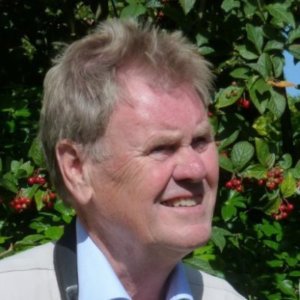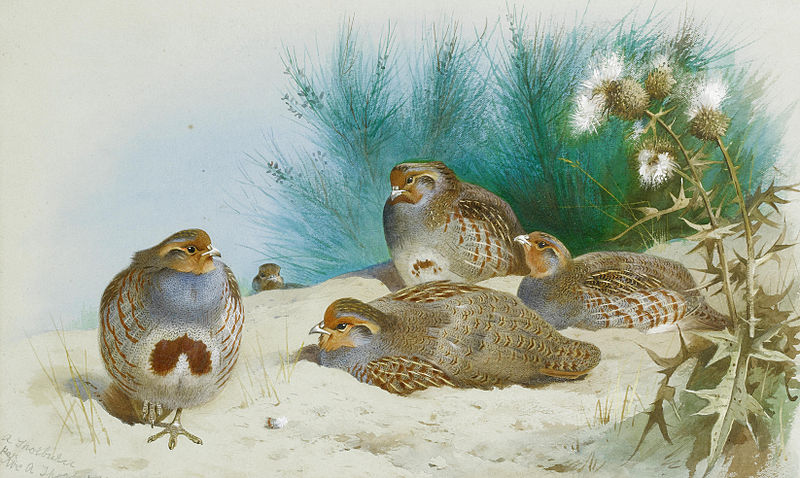
I was saddened to hear yesterday that Dr GR (Dick) Potts had passed away earlier that morning, aged 78 years. Although it was a sunny day, the clouds rolled in on my mood and were only dispelled by a few phone calls with others who knew Dick, as we exchanged stories and remembrances of a man we all liked and admired.
Dick was the son of a farmer. He studied at Durham University where he gained his PhD (Studies on a marked population of the shag with special reference to the breeding biology of birds of known age.) in 1966. But it was the Game Conservancy Trust (GCT – now the Game and Wildlife Conservation Trust) with which Dick will always be associated. He worked there from 1968 as a scientist, then as Director of Research and ultimately as Director General until 2002.
When I think of Dick I think of him smiling, often talking, and very often talking about his beloved Grey Partridges or some factor which affected them. But for a much wider audience it will be his scientific research, and that of his team at the GCT, for which he will be remembered. Dick was into farmland birds long before anyone else, and talked about the farmland ecosystem whilst others were turning up their noses at the thought of it. When it became more and more obvious to the world that farmland birds were in trouble then it became more and more obvious that Dick had been telling us all this for years and had mapped out many of the important issues already.
Dick’s work on the Grey Partridge combined a thorough study of the bird itself with a far-reaching analysis of the artificial habitat in which it is now found in the UK, field experiments and some of the earliest uses of biological modelling in avian population dynamics in the UK. This showed, above all else, the impact of agricultural pesticides on the food resources of Grey Partridges (the indirect (ie food chain) impacts of pesticides rather than the direct (poisoning) impacts). There are scores of scientific papers and many books on the subject and they form a lasting legacy of his work. It was that work under Dick’s leadership that built the GCT’s scientific reputation over a period spanning the 1970s, 1980s and into the 1990s.
As GCT Director General Dick had to spend some of his time, more than he would have wished I always felt, dealing with issues in the uplands including those of birds of prey and Red Grouse populations. It was in Dick’s time, it may even have been his idea (I don’t know) that the first Langholm project was undertaken and I well remember Dick coming to see me in my office at the RSPB HQ in Sandy to ask us to be involved in the study. It was difficult to say ‘no’ to Dick because he was so likeable that one wanted to say ‘yes’, and he was pretty persuasive too.
But it was lowland arable agriculture that was Dick’s real habitat. I spent a day with him, a very enjoyable and memorable day, in his South Downs study area after he left GCT and just enjoyed his great knowledge of the place and its wildlife. For Dick knew his plants and insects as well as his birds, and he knew farmers and farming too. He was inspirational to his staff and colleagues but also to a much larger group of people who came across him far more rarely.
I do remember when I first met Dick because I was interested to see what he was like and I recall going away a little bemused because his conversation seemed all over the place. But that was Dick. I’m not quite sure how his brain was wired up, except it was differently from that of most of us, but I learned to take careful notice of what he said and to realise that Dick’s ecological intuition about lowland farming systems was very likely to be right.
When Dick was leading the GCT it was much easier to see that organisation as a respected colleague than has been the case since Dick left. When Dick said he was totally against the illegal killing of Hen Harriers then we believed him (even if he couldn’t influence his land owning members very much). When lead ammunition was banned for wildfowl shooting Dick was a bit miffed – he couldn’t see why ducks should be saved from poisoning when partridges still ran that risk. And he would have little truck with the line that raptors were wiping out songbirds, and would say so publicly. We worked together to get conservation headlands as part of agri-environment schemes and the RSPB was quick to acknowledge that the GCT ‘Salisbury Plain’ experiment not only showed that traditional gamekeeping increased Grey Partridge chick survival (which was fairly obvious) but also led to increased overall population levels (which was far less obvious until that experiment).
Dick’s scientific work was recognised widely. He received the British Ornithologists’ Union’s Godman-Salvin Medal in 1999 but he also received awards from game biologists, the agriculture industry and the CLA Award for Services to the Countryside.
Dick was diagnosed with pancreatic cancer in December. The last email I had from him was just over two weeks ago – and I will treasure it. My sympathies go out to Olga, and to Dick’s son and stepson.
For years, every time I’ve seen a Grey Partridge I’ve thought of Dick Potts: every time I see one in future I will remember him fondly.

Dick Potts was one of the greats of game biology and ornithology.
His work, “The Partridge” remains a masterpiece of clarity and common sense. His work lives on around the UK with headlands, game strips and the conservation of insects on farmland. He came to visit us a couple of times in Italy when I was working on Grey Partridges near Udine. I can remember his smile each time a covey rose in front of the Gordon Setters belonging to Mauro Juliano. I shall treasure that memory.
I share absolutely your deep sadness and sense of loss. So many good memories … he was indeed an inspiration and much fun.
Good writing of a great man, excellent Mark he will be missed there aren’t many of his type and when you meet them they touch your soul
My memories go back a long way. I was a new undergraduate at Durham and Dick was a PhD student. Part of his responsibilities were to supervise practical classes. In those days, we dissected something just about every week. I went to Durham from Newcastle-upon-Tyne RGS where they did not teach Biology. Well, actually, there was a one-year course for prospective medics, to avoid the inconvenience of the prelim year. As someone who wanted to study Zoology, I was not allowed to take this course – it was just for medics!
So, off to Durham and the first practical class. ‘Open up the earthworm in the usual way’ said the schedule. Doh? Transversely with a spade? Dick took over and worked through the exercise with me. Very kind and understanding. I met him from time to time at conferences and he was always the same. The evening before the Beijing congress, he took me along to an alcoholic dinner with some Chinese game-birders. His bottle of Famous Grouse (what else?) went down a treat with the Peking Duck!
Happy (if slightly blurred) memories of a great evening with a lovely man and (as Mark says) an excellent scientist.
Very sad news.
A giant of the farmland conservation arena, I’m struggling to think of anyone who has made a greater contribution to understanding the ecology of lowland farmed landscapes than Dick Potts.
Like Mark, I also think of Dick Potts whenever I see a grey partridge, and I only ever heard him speak on the one occasion. He was indeed a great inspiration.
Mark, thank you for that fine obituary to a very fine ecologist.
I never met Dick although I’ve read some of what he wrote. He obviously made a huge contribution to the study and conservation of farmland birds and grey partridges in particular from which we have all learnt. It is disappointing that GWCT has not continued his high standards, in that he is already missed.
So sad to learn that Dick past away. The scientific, conservation and shooting communities loose a good friend. He was very much appreciated internationally (e.g. at the International Union of Game Biologists) and for me personally he has often been of guidance and inspiration throughout the 32 years that I was in charge of the European hunters’ federation FACE. For instance, my attitude towards lead shot owes much to what Dick told me about its effects on gamebirds and other wildlife.
Yves – thank you for your comment and best wishes to you.
I met Dick first when the CIC reorganized and created three divisions with Dick heading the science division and myself the culture division. Apart from the vast knowledge of his subject I valued him as a human being: full of good humour, always ready to listen to everyone who approached him and always kind and positive. We had many a good laugh together. To me he will always remain an example of the kind the kind of person of which the CIC would need more!
Farewell Dick – may you blessed with many healthy partridges in the eternal hunting fields!
Jozsef – thank you for your comment. I remember laughing with Dick too.
Just back from Dick’s funeral today. A deep influence on my life and approach to ecology. I was great to meet again with so many people who owe him so much.
I only met him once as the speaker at a Pulborough & Petworth NFU meeting, needless to say he left a lasting impression with his boundless enthusiasm. Sad to hear (belatedly) of his death.
VJ – thank you for your comment.
A great man with such vision. I met him twice when he came to advise us on our grey partridge project in the late 80’s.
Such knowledge and enthusiasm, it’s a shame he is still not with us to influence some of the conservation work that’s going ahead now.
What has happened to the relationship between the game conservation trust and the RSPB?
There appears to be a great wedge between them to the detriment of all birds.
You rightly talk about Habitat & Predator control. As you have admitted you agree with Dick that Habitat and predator control are fundamental to bird survival.
Yet all I read and see from certain tv presenters is the opposite to what you and Dick believed.
Wouldn’t it be great for both side to join forces in a Dick Potts conservation project and agree that Habitat & predator control is fundamental to bird survival.
Look a the langholm project 10 years of work failed when predator control was stopped.
Lake Vyrnwy project again is failing because of poor habitat management & predator control.
Please keep up Dicks legacy as he had great vision and could see where things were heading.
PS.
Nice obituary to a great man Mark.